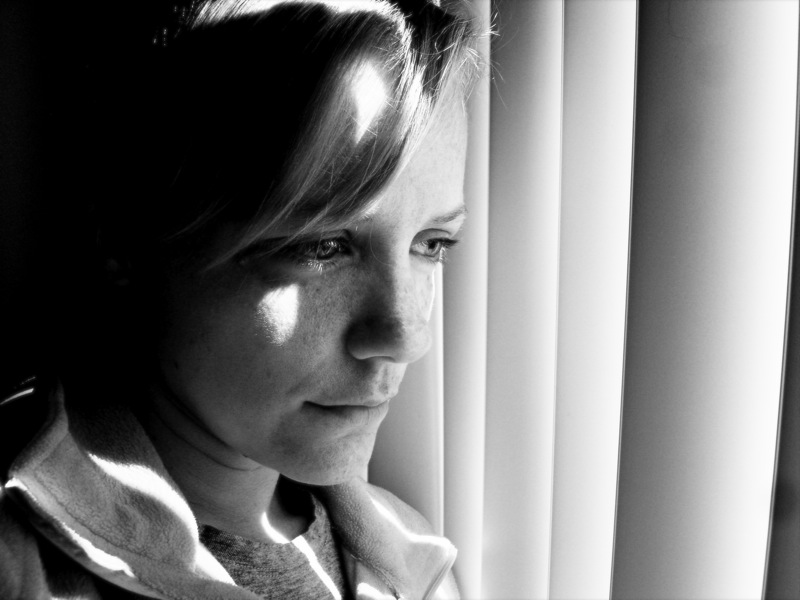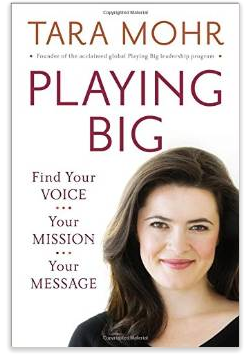What do you do with fear – when you’re on the verge of starting something new – and the fear sirens start to blare?
I’m dealing with that fear now. Old voices are kicking in as I prepare to launch my first podcast in February. I want to know whether my fear is:
- A warning bell from my intuition that the timing or the project isn’t right and I should back away?
- An echo of core insecurities that still haunt me that I need to let go of? (What if no one likes it/me or will listen?)
- An indication that my mind is very anxious because I don’t know how it’s all going to work out?
- A sign that I’m on the verge of something big that’s going to open me up to wider possibilities and expand my life?
Master coach and author Tara Mohr, in her new book Playing Big (a book I wish I’d read years ago – it’s that good!), gives us some new ways to look at fear.
Drawing from Jewish tradition and the work of Rabbi Alan Lew, she distinguished two kinds of fear, pachad and yirah.
Pachad is “the fear of the phantom, the fear whose object is imagined.” Pachad is when we worry at length about imaginary scenarios and what might possibly happen.
Tara writes, “Pachad fires anytime we perceive a potential threat to our emotional comfort zone.” Boy, do I know that one!
Pachad, she says, comes with physical tension and contraction. Pachad is uncomfortable and keeps us from wanting to “play big”. I see that scenarios 2 and 3 above are pure pachad, because I’m spinning off into past memories and future-based worries.
Yirah is a totally different kind of fear when we’re staying in the moment and it’s one to welcome. Yirah comes up when we’re on the verge of something big, when we’re moving into a larger space and feel the excitement and energy of new growth about to happen.
I feel Yirah before I go on stage to present or perform. I may want to barf – and I usually run to the bathroom too many times. But once I’m on stage, I feel alive, with a special energy, like there’s a voice that wants to come through me. I feel expanded and present in the moment.
You may experience yirah on the verge of a big game, a trip, or anything that you know is about to expand your life. Those moments of yirah are where we may experience our truest selves – or feel a connection with the divine.
The third kind of fear I experience, is intuitive warnings. Tara doesn’t talk about this in her chapter on fear, but this is one fear we should heed.
Like Yirah, intuitive warnings are very grounded in the present. According to Dr. Judith Orloff, writer/psychiatrist/intuitive, our intuition conveys information neutrally, like a cool, detached and helpful truth. Unlike pachad, there’s no blazing swirl of emotion to sort out. Intuitive information should feel right in our bodies – in our guts.
When I’m jumping my horse, I’m always scared – and I need to know if I’m dealing with yirah, pachad or an intuitive warning. At a horse show, I’m usually in yirah, scared, but full of energy and definitely in the moment. Pachad has my heart pounding as I look at particular jumps set up for my weekly lesson. Before I even tack up, I’m seeing worst-case scenarios.
The problem with pachad is that it makes me less safe. I tighten up, stop breathing, and forget to do the things I should do to have a safe ride (keep my eyes up and my weight in my stirrups).
But occasionally, I get intuitive warnings, usually from my body. When I listen I can hear that I’m too tired or too stressed to be safe jumping anything more than very minor obstacles. I’ve learned (alas, the hard way – falls aren’t fun), that when I get this warning, it’s important to back off.
Here’s a list of suggestions Tara Mohr gives for dealing with pachad.
Heart based tools
- Tap into your inner mentor. How would s/he view the situation?
- Invite love in. Use a little prayer or invitation.
- Get curious. Discovery and learning can trump fear.
- Shift into another positive space. Picture an energy or memory that can calm and renew you.
- Reconnect to your desire to serve.
- Talk with your younger self. If your inner child is terrified, the protective loving adult you may be able to offer some warm guidance.
Cognitive tools
- Label it. Naming the fear diminishes its intensity.
- Analyze truth, possibility, probability.
- Come back to the present moment.
- Follow the fear to the endgame. Maybe that worst case wouldn’t be so terrible.
Somatic tools
- Breathe.
- Do a physical relaxation.
- Visualize or look at calming imagery.
- Use music. Pick music that’s comforting and calming.
- Move through it. Notice the fear and where it shows up physically in your body. Don’t fight it, stay with it, and notice. Often it will soften.
So back to my podcast. It’s time to investigate my fear and identify its flavor:
Check one: When I talk to my body it doesn’t give me any intuitive warnings to stop. In fact, I’m excited. I know it’s O.K to proceed.
Check two: Pachad is up and there’s work to be done. Time to let go of the old “what if they don’t like me” script. I need to breath, make a plan, move forward, and stay grounded in the present moment. (Tara’s tips will be useful!)
Check three: Yirah. Yep. Got this. too. But here, I can lean into this fear and even welcome it. With each interview, there’ll likely be a moment of not-knowing, an excitement, a surrender to an unknown outcome. It may still feel a bit scary. But it will be alive and engaging, too.
Would I have it any other way?
Here’s to playing bigger! photo by Amy WIlbanks on Flickr
p.s Can’t wait to share the podcast: Core WISDOM: Leading and living with depth, creativity and daring!













3 Responses
This is a wonderfully powerful post. Both inspiring and practical. In my experience, fear is always about ghosts whispering, or sometimes screaming, that I am good enough; that I am not up to the task. I feel fear a lot. Although I have given hundreds and hundreds of presentations and led many projects , fear still haunts me. But I have found that the enemy does not live in the shadows. It lives within me in the form of fear. Faith also lives within me. The question becomes which is stronger, my fear or my faith? Regardless of the form fear takes, faith turns it away.
Wonderful discussion on “fear”. Just today I read a blog about the “fear of the Lord”, that it is not fearfulness, that this kind of fear actually does not stem from me, but from the flow of God’s love toward me. Its the interaction that I have with His kindness that causes an awesomeness (good fear) to rise up and embrace my emotions…..and that acknowledgement and acceptance leads to wisdom. Your blog here just added more weight to this new understanding I now have about the “fear of the Lord is the beginning of wisdom.” Thanks!
Thank you Gary.